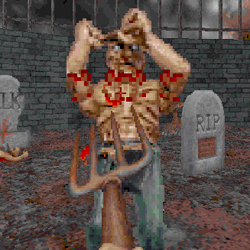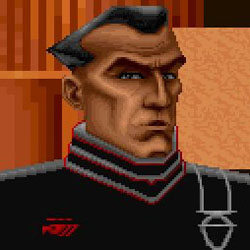
Ignition
Published: Virgin Interactive, 1997Get it from Abandonia
Ignition is in our minds undoubtedly one of the most loved and forgotten racing games ever made, something it owes to is Micro Machines styled perspective more than anything else.
Unlike most racing games, Ignition doesn’t take itself at all seriously – there’s no gear shifting, no pedestrians to avoid and no need to worry about upgrading your cars. All you need to worry about is not veering off the linear, but tremendously colourful courses and making sure you land the huge jumps just right. Oh, and avoiding the bizarre obstacles, like boulders that randomly tumble across the road.
It’s unfortunate that the game didn’t get more acclaim of course, though the plus-side of being an abandonware game is good too. Ignition has some tremendously fun levels, is more high-octane than all the last Need for Speeds combined and really shows how accessible and enjoyable a good racing game can be. It even has a tonne of special and unique game modes that help distinguish it even further.
While the low-polygon graphics do slightly hamper the visuals in Ignition, the combination of sheer speed and wild racecourses make Ignition a game to remember.
Blood
 Published: GT Interactive, 1997
Published: GT Interactive, 1997Get it from Abandonia
While a second game in Monolith’s gory shooter series was eventually released in full 3D, it’s the original Blood that we favour somehow. True, this first instalment might be pixelated and unwieldy thanks to the (even then) outdated Build engine, but this is the definitive Blood and it packs more comedic punch than a clown with a sledgehammer.
The plot to the game isn’t something that anyone really needs to understand and the game makes it clear from the off that it’s pretty irrelevant and serves only as an excuse to be as gory as possible, but we’ll summarise anyway. Basically, you’re a resurrected cultist from the wild west who was sacrificed long ago to an evil god and has now risen for payback.
See? Pretty flimsy stuff, especially when you consider that the levels don't even run together coherently. One moment you're rising from your grave and spouting cheesy one-liners, the next you're running through a carnival next to a haunted medieval castle, shortly before ploughing through a zombie-filled shopping mall. The levels aren't based on an actual narrative, just whatever the designers thought sounded cool at the time.
All that you really need to know though is that Blood is about trying to be as funny and over the top as possible, letting you decapitate enemies and then kick their heads around for fun. With more secret areas than a frigid ninja and as many cheesy lines as all Bruce Campbell movies combined, Blood is a great little shooter from the times of yore - though it does have an unhealthy obsession with killing mimes and monkey-boys.
Dune
 Published: Virgin Interactive, 1992
Published: Virgin Interactive, 1992Get it from Abandonia
Ah, Dune – one of the most ham-fistedly handled franchises ever conceived and also one of the first games I played (or rather, watched my father play) on my Amiga A500+. Unfortunately though, it proved too difficult for my Dad and I at the time and I later revisited this PC port of the genre-blurring epic a few years ago.
Not attached to Westwood’s later well-known strategy game Dune 2, this original game stays closer to the book and is part-adventure game and part-RTS. Dune casts players as Paul Artreides, a young noble who is entrenched in a bitter war with House Harkonnen and is forced to recruit a rag-tag army of desert dwellers around him.
It’s this recruitment stage that takes up the adventure game half of Dune, with Paul taking a team of advisors around the planet of Arakis to try and tempt the natives into joining him. Along the way he gets his fair share of nomad nookie, as well as some psychic powers and such. When these kick in the RTS game starts and Paul must work to manage the economy at the same time as fighting in the war.
While this first game in Frank Herbert's epic, but over-exploited franchise is a lot slower to get going than you might be used to, it rapidly becomes an exciting and challenging game full of micromanagements - though if you really want to stand a chance at beating the game then it's best to push through it as fast as possible, before the Emperor's taxes become too steep to pay.

MSI MPG Velox 100R Chassis Review
October 14 2021 | 15:04









Want to comment? Please log in.